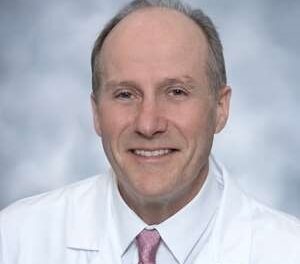.jpg) Miami Cancer Institute at Baptist Health
Miami Cancer Institute at Baptist Health
When Mariana Khawand-Azoulai, M.D., was in medical school at the University of Florida, she served a rotation at the Veteran’s Administration Hospital. There, she saw a palliative team at work, and something clicked for her. She decided to make palliative care her life’s work. “I thought the way they cared for patients was so compassionate, personal and practical,” she said.
Together with Suleyki Medina, M.D., Dr. Khawand-Azoulai is working to build an outpatient palliative team at Miami Cancer Institute at Baptist Health. The group will soon include of two nurse practitioners and a social worker, providing services in a team-based approach alongside specialists in nutrition, physical therapy, social work, psychology and more.
“There are very few outpatient palliative care programs in the country — most are hospital based,” Dr. Khawand-Azoulai noted. The services will function under the direction of Leonard Kalman, M.D., Deputy Director and Chief Medical Officer of Miami Cancer Institute.
The team approach is critical to making the greatest impact in the lives of patients and their families, Dr. Khawand-Azoulai said. “It’s very multi-dimensional so we can give the patients ‘whole person’ care,” she explained. “Miami Cancer Institute has been very forward-thinking is setting this up this way. They are emphasizing that extra layer of support.”
Assisting patients in dealing with their challenges is incredibly gratifying, she said. “It’s like holding the hand of the patient and the family through a difficult time,” Dr. Khawand-Azoulai said. “Our job is to ease the suffering that comes with serious illness, not just with a focus on the physical, but also emphasizing practical, emotional and spiritual concerns.”
The significance of palliative care: “Cancer patients need more than just oncology care,” Dr. Khawand-Azoulai said. We empower patients to participate in their treatment by helping them to understand their options so they can make decisions in line with their goals and values.”
On the emotional challenges of the job: “There are hard days, and days we do sometimes cry,” Dr. Khawand-Azoulai said. “What keeps me going is that I feel I truly help patients and their families. I get to help them feel as good as they can.”
Why this field is meaningful to her: “All through med school I wanted to do ‘whole person’ care. I’ve always been interested in the person, their life, what kind of person they were before this disease. I wanted to focus on the person, not just the disease,” Dr. Khawand-Azoulai said.
Learning the wishes of the patient can require some deep and intimate discussions, Dr. Khawand-Azoulai said. “We’re the ‘difficult conversation’ people. I try to help patients explore their options and determine what’s important to them, so we can proceed with treatment that is most in line with their values.”


























